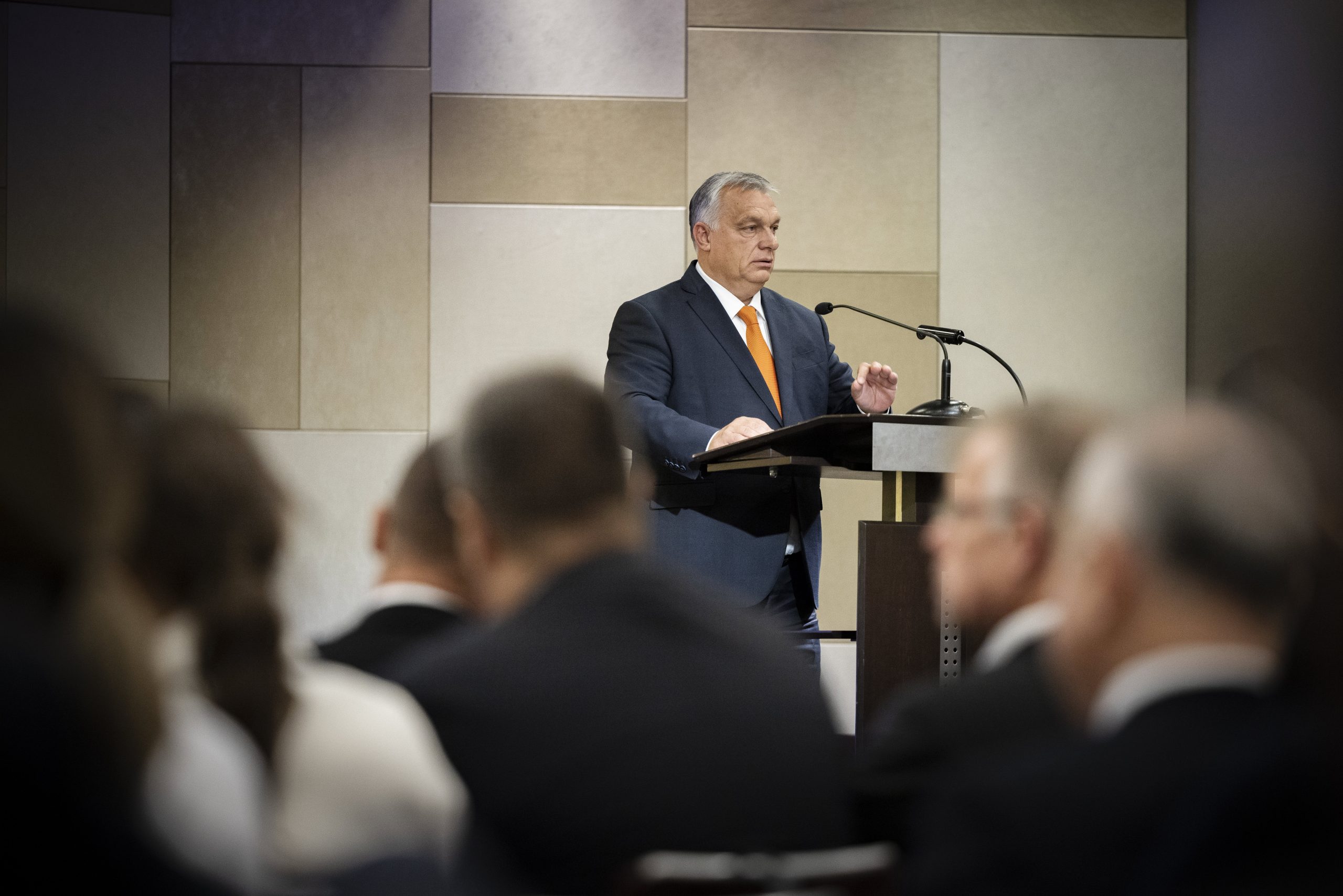
Prior to the forum, the Prime Minister also met with German Chancellor Olaf Scholz. Regarding the meeting, he said they had had fruitful talks; at the two-hour-long meeting, they spoke about every difficult and complex topic, and “everyone could be happy” with its outcome.
Mr Orbán also recalled that every two years he paid a visit to the chancellor and the German economic community.
In his address, the Prime Minister said there were political reasons for the fact that since 2010 Hungary had managed crises successfully.
He recalled that during the global economic crisis, in Europe there had been a debate about whether the crisis was a cyclical or structural crisis. Most European countries regarded it as a cyclical one, Mr Orbán said, adding that he never accepted this interpretation and regarded the crisis as structural due to the fact that Europe will continually lose against Asia in terms of GDP, markets and technological competition unless it implements changes.

Mr Orbán described profound structural reforms as the right answer to this crisis, and added that after 2010 they had transformed the Hungarian economy accordingly.
He stressed that the Hungarian model was conservative regarding social policy; a policy resembling the period of German Chancellor Helmut Kohl. The government thinks in terms of a workfare society, with the family at its centre. Hungary is spending the most on family support in relation to its gross domestic product, and the government is fundamentally financing families through work. While in 2010 the employment rate was barely above 50 per cent, today it stands at around 75 per cent, he recalled.
The Prime Minister stated that the government also built upon national pride, and would like this to be based increasingly on the nation’s performance.
In Hungary there is no multiculturalism, he added.
In Mr Orbán’s words, one of the most important elements of the economic foundations of the Hungarian model is a low level of taxation. Hungary is the only country in the world with a flat-rate personal income tax, there is no inheritance tax, and the corporation tax, too, is low at 9 per cent. As regards equal opportunities, the Hungarian position is that equal opportunities must be offered on the input side, meaning in education and employment. At the same time, as regards the output side, the side of performance, “we are more in favour of differences,” he highlighted.

The Prime Minister also said if Hungary does not protect its borders, the single internal market of the European Union could collapse. He stressed that as Hungary was an open country, border protection must also form a part of its economic policy.
He said during the period ahead we needed political security, energy security and physical security. Political security is guaranteed by the government’s stability, physical security can be guaranteed, among others, by the fact that Hungary will continue to remain an island of peace, while it is an important part of energy security that the country has enough gas reserves for six months.
“Those who cooperate with us stand to gain by us”, Mr Orbán pointed out.
Addressing German businesses, he stressed that there were no surprises in the Hungarian economy; we are able to tell precisely what medium- and long-term plans the government has in each sector. With a number of large German companies, agreements in the fields of telecommunications, digitisation and transition to green energy continue to remain in effect, and these agreements are primarily about the areas in which they are able to join the Hungarian modernisation programme.

He took the view that Hungarian-German economic cooperation is fundamentally based not on economic foundations, but is cultural in its nature. He said in Hungary “there is a positive bias” for Germany, partly for historical reasons, and partly thanks to Germany’s cultural performance. The foundations of bilateral cooperation cannot be destroyed by any political campaign or occasional disagreements on economic issues, he pointed out.
He also highlighted that in Hungary today as many as 6,000 German businesses find that their investments yield satisfactory profits, and 300,000 families earn a living in workplaces operated by German companies. Hungary is the world’s fifth most high-tech-minded country, and also regarding its export performance, it is ranked much higher than the country’s population would warrant. Hungary is additionally among the world’s 10 most open economies based on the ratio between exports and GDP, and is also one of the ten most complex countries regarding the complexity of its GDP, meaning that it relies on the output of a number of sectors.
Mr Orbán said today the greatest challenge is that the continent is facing a threat of recession, among others, due to the steep rise in energy prices. At the same time, the main question is whether – if recession does hit Europe – Hungary will be able to hold its ground on its own. He took the view that to this end, the emphasis must be placed on development, investments and technological innovation. He said, thanks to this aspiration, this year there is a 5 to 6 per cent growth, while last year the economy expanded by 7 per cent.


